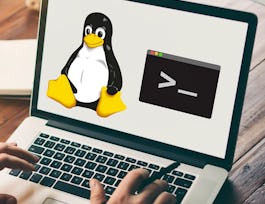This course is tailored for those who are new to the Linux operating system and want to build a solid foundation. It begins with an overview of Linux, explaining its unique characteristics, the benefits it offers over other operating systems, and the different distributions available. By the end of the introductory section, you will have a clear understanding of what Linux is and why it’s the preferred OS for many professionals.



Linux Operating System: A Complete Linux Guide for Beginners

Instructor: Packt - Course Instructors
Sponsored by Coursera Learning Team
Recommended experience
What you'll learn
Identify key Linux commands and system utilities.
Explain the Linux file system hierarchy and terminal usage.
Install and configure Linux Mint in a virtual environment.
Distinguish between different Linux distributions and their use cases.
Details to know

Add to your LinkedIn profile
5 assignments
October 2024
See how employees at top companies are mastering in-demand skills


Earn a career certificate
Add this credential to your LinkedIn profile, resume, or CV
Share it on social media and in your performance review

There are 10 modules in this course
In this module, we will introduce the course, outlining its primary goals and structure. You will gain an initial understanding of Linux, its definition, and why it’s a preferred operating system in the corporate world.
What's included
5 videos1 reading
In this module, we will explore the origins of Linux and delve into its major distributions. You'll also understand how to choose the right distribution for this course and compare interfaces like GUI and CLI.
What's included
4 videos
In this module, we will guide you through the process of downloading, installing, and configuring Linux Mint using VirtualBox. You’ll also learn alternative methods to install Linux without a VM if necessary.
What's included
7 videos1 assignment
In this module, we will introduce the Linux Mint user interface and terminal. You will learn to run commands in the terminal and explore the Linux file system's structure, along with basic and advanced directory commands.
What's included
7 videos
In this module, we will focus on handling files and directories within the Linux environment. You’ll learn to manage, search, and edit files using various commands and Linux-based editors.
What's included
9 videos
In this module, we will cover essential system and utility commands. You’ll gain insights into checking system information, managing users, changing file ownership, and setting permissions.
What's included
8 videos1 assignment
In this module, we will dive into networking basics on Linux. You will learn how to check your IP, configure a bridged network in VirtualBox, and manage firewall settings for secure network communication.
What's included
4 videos
In this module, we will discuss memory management and processes in Linux. You will learn how to monitor system processes and memory, as well as how to end unresponsive tasks.
What's included
3 videos1 assignment
In this module, we will introduce you to advanced Linux features such as coding, server setup, and shell scripting. You’ll learn how to run C programs, install Apache, create web pages, and automate tasks with shell scripts.
What's included
4 videos
In this bonus module, we will demonstrate how to make USB devices work seamlessly with VirtualBox. You’ll learn how to configure both internal and external USB devices within a VM.
What's included
2 videos2 assignments
Instructor

Offered by
Why people choose Coursera for their career




Recommended if you're interested in Information Technology

Open new doors with Coursera Plus
Unlimited access to 10,000+ world-class courses, hands-on projects, and job-ready certificate programs - all included in your subscription
Advance your career with an online degree
Earn a degree from world-class universities - 100% online
Join over 3,400 global companies that choose Coursera for Business
Upskill your employees to excel in the digital economy





